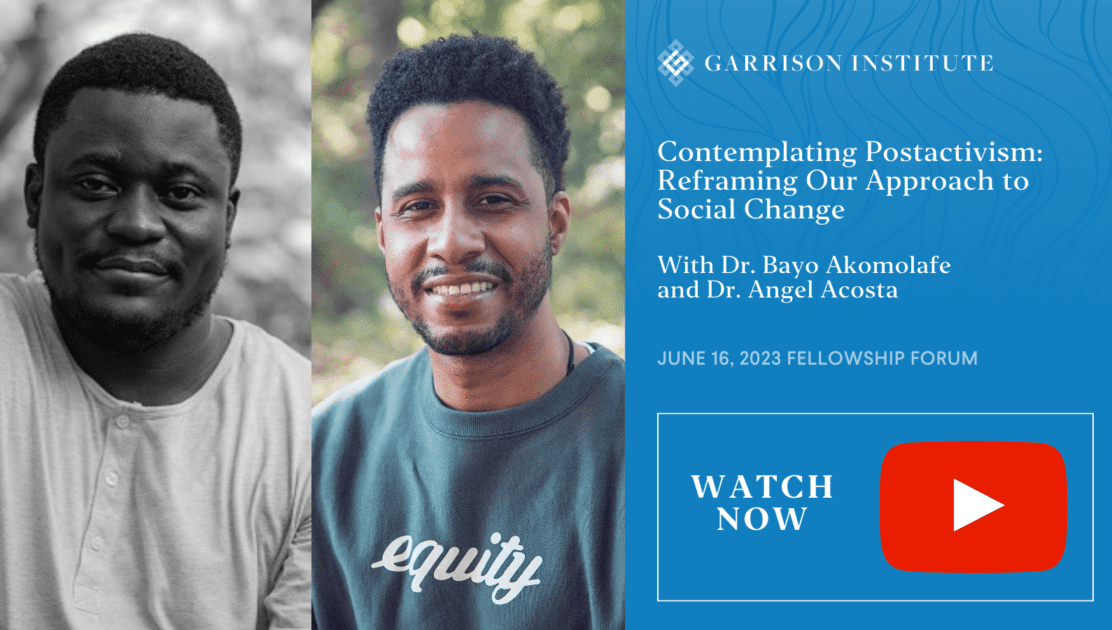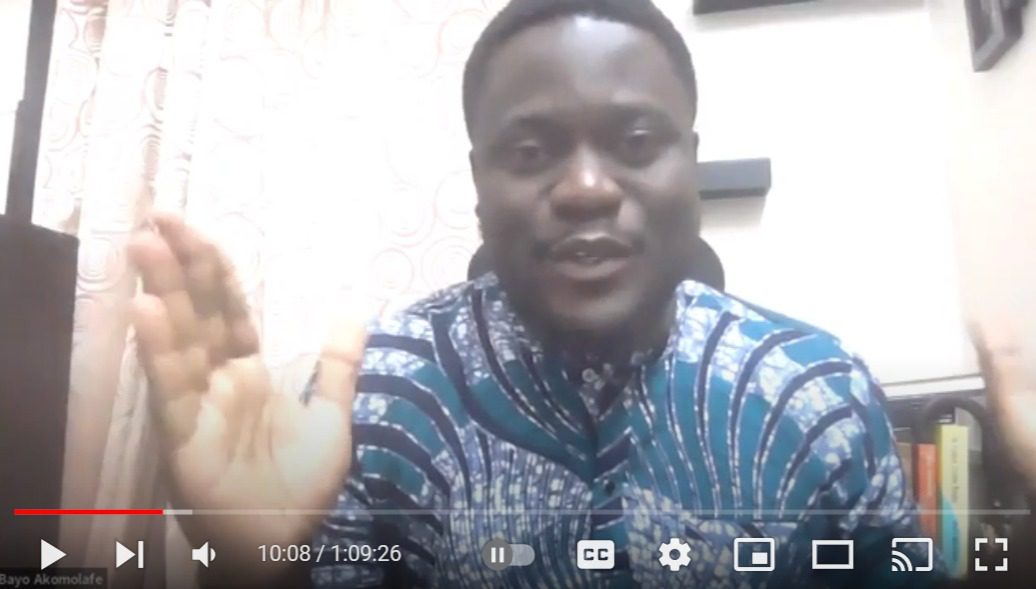Dr. Bayo Akomolafe on “Postactivism”
In this talk with Garrison Institute Fellowship Director Dr. Angel Acosta, “Contemplating Postactivism: Reframing Our Approach to Social Change,” Bayo Akomolafe began by asking the provocative question: “What if the way we respond to the crisis is part of the crisis?”
Dr. Akomolafe is a celebrated philosopher, writer, activist, professor, and international speaker. His work produced the concept of “postactivism,” which refuses the “us vs. them” thinking of traditional activism and instead promotes nuance, the generativity of uncertainty, and the imperfection of healing. Postactivism questions, furthermore, whether traditional activism perpetuates the same logics that produced the issue it aims to solve.
This logic is familiar to us in the industrialized West: in Bayo’s words, it is part of “the modern neoliberal tradition that sees will and choice and agency as domiciled in Ann or Juliet or Val or Hillary here, that it’s inside you and you are independent and sovereign and unindebted from the world around you. That’s a very modern way of seeing things… It’s becoming increasingly difficult to see the world that way now.”
Instead, Dr. Akomolafe asserted, we can choose to view human life as inherently embedded in the body and the landscape. Here we can see the influence of Yoruba philosophy on Bayo, but even Western scientists are becoming more and more interested, for example, in the fact that our digestive system is made up of millions of tiny bacteria whose balance is critical to our health. Even our concept of the body is an Enlightenment oversimplification of the self: in our guest’s words, “the human is more than the anthropomorphic image that presents before our eyes. It is a migrant murmuration of bodies and mysteries; it’s a pattern.”
He pointed out that emotion, perhaps the most clearly subjective aspect of human experience, happens to us in the same way: “we don’t feel things, feeling enlists us in how it comes to matter.” Thus, human subjectivity is simply “the world acting upon itself.” This way of thinking, he reminded us, has its origins in indigenous research and knowledge, and changes the whole story of action and agency.
This decentering of human will reinvigorate traditional approaches to activism. No longer is the individual acting, but territories are acting themselves through us.
Bayo Akomolafe drew on the image of the footprint to illustrate this point: the footprint doesn’t belong to the mud nor to the foot, but the interstitial space that acquiesced to them to come together. This space, he suggested, is not objective nor subjective, but “transjective.” That is where we all already exist, in the in-between—and postactivism aims to help us navigate that space.
The transjective is the space of seam, fissure, crack, where the contradiction between inside and outside is overcome: “a critique of wholeness, of arrival, of continuity.” It is where our models fall apart, where the future is obscure, where our maps of what is right and wrong are scrambled and reappear as works of art. This place beyond right and wrong, inside and outside, healing and trauma, is the space of the fugitive and the trickster: two characters Bayo implied would be central to a successful postactivist future.
He was quick to remind us that his thinking is no critique of protest, but an “invitation to stay with the trouble of realizing we are creating the crisis even by acting against it.” He expressed: “I’m just asking, not speaking truth. Truth is for citizens. And I am a fugitive.” Just as he disavowed the possibility of claiming a stable truth, he explained it is also not up to us to create fissures even as we note their value: the whole point is that we are not the central actors in the universe.
Instead, we must simply acknowledge and attempt to process them. And to ask: What kind of politics can stay with the cracks, can refuse that “truth” in favor of a truer kind of beauty? In a world where healing can get in the way of becoming well, and justice may shoulder in front of transformation, what aesthetics can accommodate this upside-down version of human will, and step us forward into a yet healthier, freer future?
___
Established in 2020, the Garrison Institute Fellowship embraces the emergent nature of our times. Widespread socio-political discord, an escalating global pandemic, the ongoing environmental crisis, and socioeconomic precarity have created an inflection point fraught with collective anxiety and the potential for new leadership paradigms. In response, an emerging field of organizations and networks are applying contemplative wisdom to catalyze healing and action. The transformative change at the core of their work will benefit from visionary leadership that will invigorate our collective imagination and help us to harness the practical skills needed to navigate our turbulent times.

